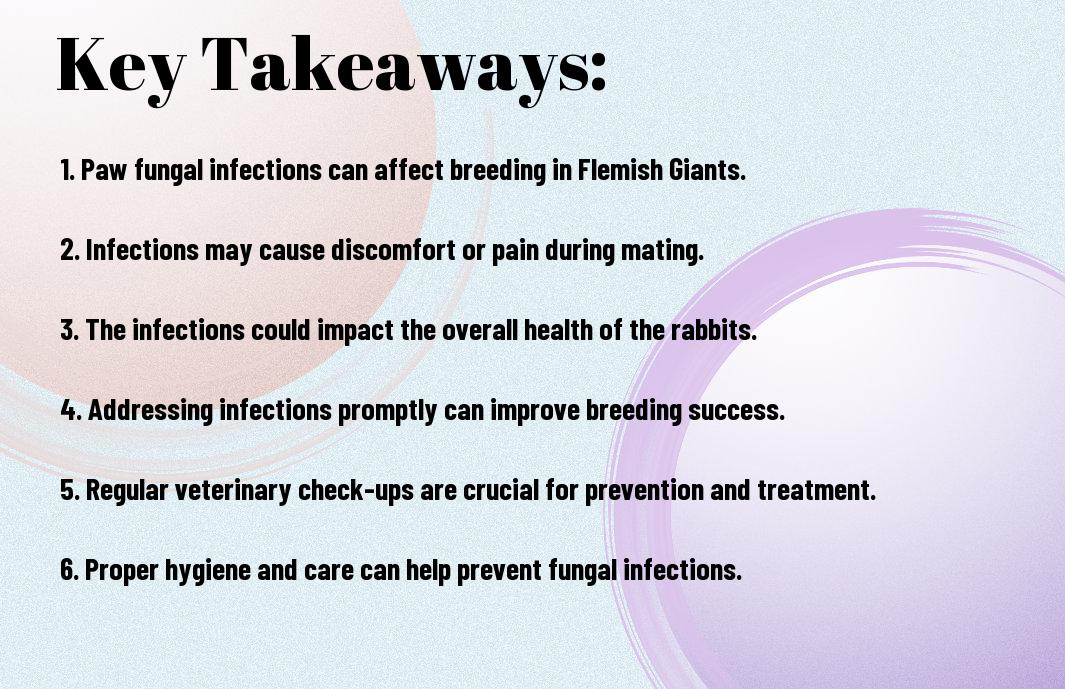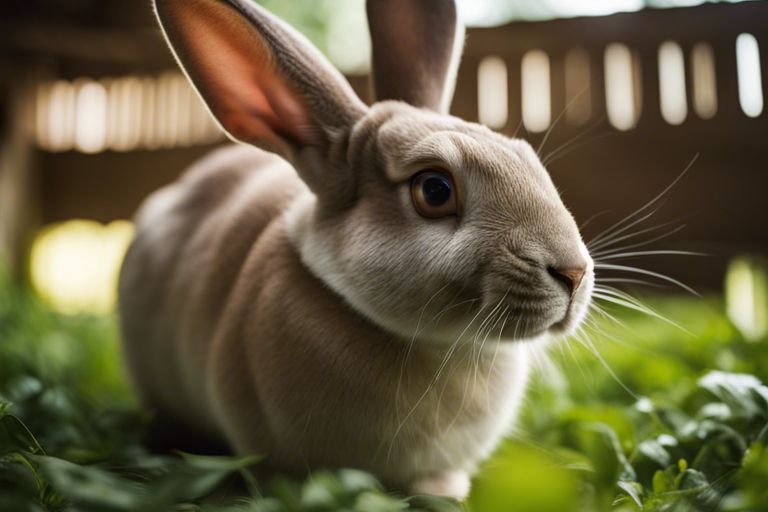Do you know if the paw fungal infections on your Flemish Giant rabbit can affect their breeding abilities? In this informative blog post, we will explore the potential impacts of paw fungal infections on the breeding of Flemish Giants. We will address the risks involved and provide guidance on how to prevent and treat these infections to protect your rabbits and their breeding potential.
Key Takeaways:
- Fungal infections in the paws of Flemish Giants can affect their breeding ability. Paw fungal infections can cause discomfort and pain, leading to decreased mating activity and potentially affecting the breeding success of the rabbits.
- Proper hygiene and care are essential in preventing and managing paw fungal infections. Regular cleaning, inspection, and treatment of the paws are crucial in maintaining the health and well-being of Flemish Giants, ultimately supporting their breeding success.
- Consulting a veterinarian for proper diagnosis and treatment is highly recommended. If paw fungal infections are suspected or observed in Flemish Giants, seeking professional guidance and care from a veterinarian is vital in addressing the issue effectively and preventing any negative impact on their breeding.

Understanding Flemish Giants
Obviously, understanding the breed of Flemish Giants is crucial when it comes to breeding them. These rabbits are known for their impressive size, with the ability to grow up to 20 pounds or more. They are gentle giants, known for their docile nature and good-natured temperament. Flemish Giants also have a strong social nature, enjoying the company of their human companions.
If you are considering breeding Flemish Giants, it is important to be aware of potential health issues that can affect them. Pasteurella: Its Health Effects in Rabbits is a common concern in rabbits, and it’s important to understand how it can impact the health of your Flemish Giants.
Physical Characteristics: Size and Strength
The most notable physical characteristic of the Flemish Giant is its size. They are one of the largest domestic rabbit breeds, with some individuals reaching sizes of 20 pounds or more. Their large, powerful build gives them a commanding presence and impressive strength. This size and strength can be both a positive and a potential risk factor in breeding. It’s important to carefully consider the health and genetics of the rabbits you plan to breed to ensure the best outcomes.
Behavioral Aspects: Temperament and Socialization
When it comes to temperament, Flemish Giants are known for their gentle and docile nature. They are typically calm and friendly, making them great companions. However, it’s important to note that they are also social animals that require regular interaction and attention. Ensuring proper socialization and handling of these rabbits is essential for their well-being. When considering breeding, it’s important to choose rabbits with positive temperaments to pass on these favorable traits to their offspring.
Health Considerations in Breeding
However, when it comes to breeding Flemish Giants, there are several health considerations that you need to keep in mind. One such consideration is the impact of paw fungal infections on the reproduction of these rabbits.
Impact of Paw Fungal Infections on Reproduction
If your Flemish Giant rabbit has a paw fungal infection, it can have a significant impact on their ability to breed. Fungal infections can cause discomfort and pain, making it difficult for the rabbit to engage in reproductive activities. In severe cases, the infection can even lead to infertility. It’s important to address any fungal infections promptly to ensure the health and reproductive success of your rabbits.
Importance of Veterinary Care: Check-ups, Vaccinations, and Parasite Prevention
Regular veterinary care is essential for maintaining the health of your breeding rabbits. Routine check-ups and vaccinations can help prevent common health issues that could affect their ability to breed. Additionally, implementing a parasite prevention program is crucial to ensure that your rabbits remain healthy and free from harmful infestations. By providing proper veterinary care, you can significantly reduce the risk of health issues impacting the breeding success of your Flemish Giants.
Management and Prevention Strategies
Now that you understand the potential impacts of paw fungal infections on the breeding of Flemish Giants, it’s important to focus on management and prevention strategies to ensure the health and wellbeing of your rabbits. By implementing a few key practices, you can minimize the risk of fungal infections and maintain optimal breeding conditions for your Flemish Giants.
Best Practices in Grooming and Hygiene
When it comes to preventing paw fungal infections in Flemish Giants, proper grooming and hygiene practices are essential. Regularly inspect your rabbits’ paws for any signs of irritation, redness, or abnormal growth. Keep their living quarters clean and dry, and make sure to provide them with a comfortable and spacious environment to minimize the risk of fungal growth. Additionally, pay attention to the grooming products you use and opt for ones that are gentle and suitable for rabbits to avoid any skin irritation or damage.
Nutrition and Diet: Influences on Health and Breeding
Your rabbits’ diet plays a crucial role in their overall health and immune system function, which in turn can impact their susceptibility to fungal infections and their ability to breed successfully. Ensure that you are providing a well-balanced diet rich in essential nutrients, vitamins, and minerals. Fresh hay, leafy greens, and high-quality pellets should be the foundation of their diet. Avoid overfeeding your rabbits, as obesity can weaken their immune system and make them more vulnerable to various health issues, including fungal infections. Adequate hydration is also important, so make sure your rabbits have constant access to clean, fresh water.

Alternative Care and Treatment Options
To ensure the health and well-being of your Flemish Giants, it is crucial to explore alternative care and treatment options for paw fungal infections. While conventional medication is often the go-to solution, it is important to consider alternative therapies that can complement or even replace traditional treatments. This chapter will provide you with insight into alternative care and treatment options that can aid in managing and preventing paw fungal infections in your beloved Flemish Giants.
Remedies for Paw Fungal Infections
When it comes to remedying paw fungal infections in your Flemish Giants, natural and holistic treatment options can play a pivotal role in their recovery. Utilizing home remedies such as apple cider vinegar soaks, coconut oil, and herbal poultices can aid in alleviating symptoms and promoting healing. These natural remedies can be used in conjunction with prescribed medication to enhance the treatment process and provide relief to your furry companions.
Role of Neutering, Pet Nutrition, and Positive Reinforcement in Breeding
Neutering your Flemish Giants can significantly reduce the risk of paw fungal infections and other health issues associated with breeding. Additionally, ensuring a balanced and nutrient-rich diet for your rabbits can strengthen their immune system and enhance their overall health, making them less susceptible to fungal infections. Positive reinforcement and a stress-free environment can also contribute to the well-being of your rabbits, reducing the likelihood of developing health complications.
FAQ
Q: Can paw fungal infections affect the breeding of Flemish Giants?
A: Yes, paw fungal infections can affect the breeding of Flemish Giants. Fungal infections can cause discomfort and pain, making it difficult for the rabbits to mate. Additionally, if left untreated, fungal infections can lead to secondary bacterial infections, further impacting the breeding process.
Q: How can I prevent paw fungal infections in Flemish Giants?
A: To prevent paw fungal infections in Flemish Giants, it is essential to maintain a clean and dry living environment for the rabbits. Regularly clean and sanitize their living space, and ensure they have access to dry and clean bedding. Additionally, monitor their paw health and seek veterinary care at the first signs of infection.
Q: What are the treatment options for paw fungal infections in Flemish Giants?
A: Treatment for paw fungal infections in Flemish Giants typically involves antifungal medications and topical treatments. It is important to consult with a veterinarian for an accurate diagnosis and proper treatment plan. In severe cases, oral medications may be necessary to eliminate the fungal infection and prevent it from affecting the breeding of the rabbits.
